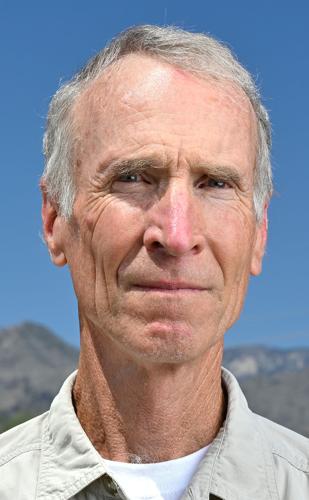Democrats are trying to take control of the Arizona Senate for the first time in decades, and analysts say that could be decided by voters in a handful of districts including the Tucson area’s District 17.
Political newcomer John McLean, the Democratic candidate in District 17, is hoping to flip the seat by defeating Republican former state senator Vince Leach. The Senate has a 16-14 GOP edge. If Democrats pick up one seat Republicans would be required to share power, while gaining two seats would give Democrats control.

McLean
“The change that people will see is rather than just stalling any forward progress on water, education and rights, you will see these issues go to the floor where we have an open discussion and open debate,” McLean said about the potential of flipping the Senate. “That’s a fundamental change, and it’s got to happen.”
“You can’t have a magic wand and fix everything,” Leach countered. “That doesn’t happen.”
Leach aims to maintain Republican control and is pitching voters on his previous experience. He was a member of the Arizona House of Representatives from 2015 to 2019 and a state senator from 2019 to 2023.
He lost the 2022 GOP primary for Senate to Justine Wadsack. This past July, however, he edged out Wadsack, earning 52% of the vote, in a rematch.

Leach
McLean has raised $448,000 for his campaign to Leach’s $280,000, according to finance reports through Oct. 14.
The race has attracted some national attention, with Jane Fonda headlining a fundraiser party Thursday in Tucson for local candidates including McLean. Fonda’s Climate PAC has endorsed McLean.
The district has voters in Pima and Pinal counties.
Abortion, education, water issues
McLean, a third-generation Arizonan and a University of Arizona alum, said the “trigger event” that led him to enter the political arena was the 2022 overturning of Roe v. Wade by the U.S. Supreme Court.
A staunch supporter of a woman’s right to choose, McLean said he would like to work on protecting access to IVF and contraceptive products if elected. He supports the Arizona Abortion Access Act that’s on the Nov. 5 ballot.
Leach is against the ballot measure. He says he supports a 15-week ban on abortions with exceptions for rape and incest.
“I would like to see children be given a chance, but I’m also a realist,” Leach said. “If we were to outlaw abortion there are people that would find other ways to abort the child, so let’s do it in a humane way in the protection of a medical facility.”
Leach also stated he believes most women know they are pregnant within the 15-week period. Viability, which is when the fetus could survive outside the womb, is typically understood by doctors to be roughly 24 weeks.
Another issue both candidates approach differently is education. While Leach made comments about the amount that students are learning about pronouns, McLean focused on how elected officials can support teachers.
A study published by Consumer Affairs last month ranked public education in Arizona as no. 51 in the country — last behind every other state and Washington, D.C.
“As a business leader, the only reason my business succeeded was we had a very, very well qualified workforce that I could draw from,” McLean said. “You don’t have a qualified workforce unless you have a really, really good education system.”
McLean made his name in Tucson by opening an office of Arete Associates, an engineering and science company, which he says generates more than $30 million in annual revenue and employs over 75.
The Democrat added that the “economic future of Arizona is dependent on having an outstanding education system,” which requires funding public education and raising teacher salaries.
McLean said it’s possible to raise teacher salaries and better fund public education by making use of the Arizona State Land trust to fund public education instead of raising taxes. He wants to use Proposition 123, which is expiring next year and will have to be renegotiated by Republicans and Democrats in the statehouse next year, to allow a higher payout rate.
Leach, a fiscal conservative whose career was in sales and executive business management, has focused his education policies less on teacher support and pay and more on school choice voucher policies.
He said the district is “blessed and cursed” with both “exceptional” schools as in the Vail School District and “problem” schools such as those in Tucson Unified School District.
“We’ve increased financing on a per-student basis from $9,600 in 2014 to about just short of $16,000 in the current year and we haven’t seen resulting increase in graduation rates or proficiency levels,” he said.
Leach said the COVID-19 pandemic that began in 2020 impacted student success in many districts across the state and country, but that states like Utah spend less on public education and have more highly rated schools.
“Utah’s not that far away,” he said. “What are they doing differently? When the Legislature tries to do something, (people shout) for local control. I would argue that in many, many cases, local control is not working in our state.”
McLean and Leach agree that water policy is one of the most important issues of this election.
McLean says he supports many of the recommendations made by the bipartisan Water Policy Council convened by Democratic Gov. Katie Hobbs two years ago. The council had representatives of rural, industrial and municipal water interests. When the group published its recommendations, they were introduced into the Legislature in January but “didn’t go anywhere,” and that is “unfinished business,” he said.
“I want to pick up the baton from those existing (bipartisan) recommendations that have been negotiated for the last 12 months or so, and turn that into actionable legislation,” he said.
Leach said McLean has a simplistic view of the water problem in Arizona.
“There’s a lot of moving parts,” Leach said. “I’m not saying it can’t be done, but to make it sound in a campaign like ‘if you elect me, I will go fix that?’ They don’t do that.”
Leach said the state is doing a good job conserving water and that certain areas are “banking water.”
He suggested stationing a plant in Mexico or California for desalinization, which removes salts and minerals from ocean water and turns it into drinking water. Leach acknowledged there were talks in the Legislature about doing that but they fell through.
Leach comment called ‘extreme’
At a Log Cabin Republican meeting in Pima County last month, Leach suggested Haitian immigrants eat dogs, the Arizona Mirror reported.
While joking with GOP Rep. Cory McGarr that Democrats wouldn’t successfully serve as dog catchers, Leach said Democrats would “feed ‘em to the Haitians.”
Leach’s comments stemmed from a conspiracy theory spread by JD Vance, the Republican nominee for vice president.
When asked by the Arizona Daily Star if he believes Haitian immigrants eat dogs, Leach pivoted to issues such as pronoun usage and what he perceives as a lack of civics education in the American school system.
When pushed on the issue, Leach said with a sly smile that he “didn’t know for sure” if Haitians ate dogs, but said he had “read news reports and police reports” on the issue. He did not cite specific articles or sources.
McLean told the Star that Leach’s comments on Haitians were “disturbing” and “show how extreme Vince Leach really is.”
“We can’t afford that. His comments were inexcusable and we deserve better,” McLean said.





